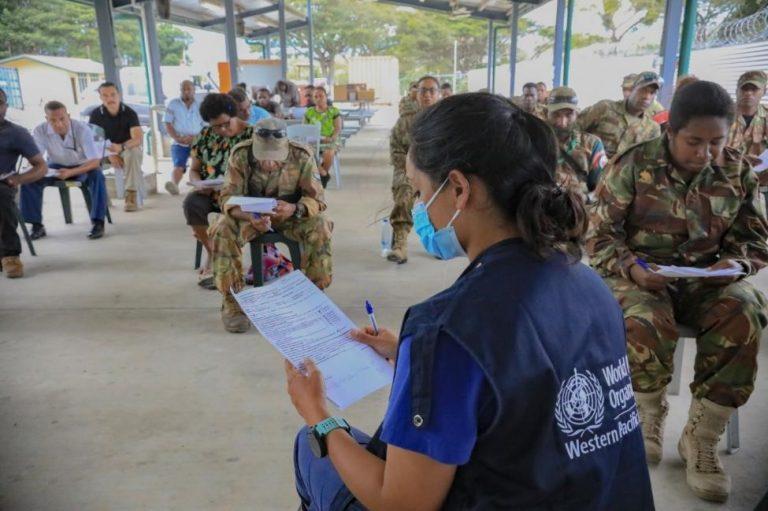Papua New Guinea (PNG) is on a state of high alert, tackling COVID-19 from community level all the way up to establishing new national legal mechanisms.
To implement testing and preventative measures effectively it is important to strengthen health services and improve public understanding about COVID-19, especially in countries like PNG where communal living is so widespread.
Raising awareness of COVID-19 and maintaining essential health services through primary health care approaches will help protect the whole population during the pandemic and beyond.
WHO is providing technical support to the Government in key areas such as primary health care, mental health, surveillance and legal reform to respond to COVID-19 and maintain essential health services during the pandemic.
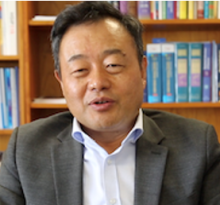
“Community engagement and action is an important aspect of stopping the spread of COVID-19. Despite PNG’s total number of cases being relatively low compared to the rest of the world, we need to remain vigilant and communicate risk effectively to prevent further transmission of the virus."
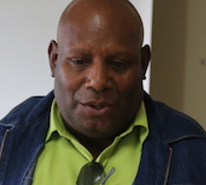
“Our current isolation ward can only accommodate seven patients, and then another three to four beds have been set up for any COVID-19 postnatal cases. If COVID-19 comes, I’m prepared to go forward to isolate and quarantine people throughout the community. I believe our province is ready, despite the limitations. But my worry is when it comes to crunch time, will our limited health workforce stand strong?”
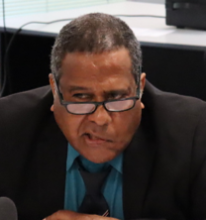
“We have scaled up COVID-19 testing at all urban clinics in the National Capital District and are expanding testing across the country. We want to encourage early health seeking behaviour for those who have COVID-19 symptoms. Together with provincial health authorities and our partners including WHO, we are using all channels of communication to educate people on early health seeking behaviour and prevention measures, as well as enforce messaging on hand-washing, mask use, physical distancing, and the need to limit social gatherings and avoid crowded areas.”
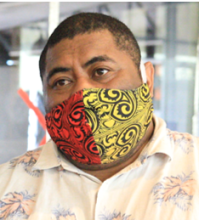
“It’s not the lethality of the disease or the percentages that we quote, but it’s the mass of populations that it can infect. And how quickly it infects will depend on us individually; how we control the spread by practicing simple prevention measures such has hand-washing, physical distancing and wearing of masks.”
THE LONG READ
“It doesn’t matter who you are or where you’ve been, you must wash your hands before you enter my house,” says Dr Gary Nou from Port Moresby, the capital city of Papua New Guinea (PNG). “If you’re sick, you’re not allowed in. I will come and see you outside. Why? Because my mother lives at (my) home and she is old. These are some prevention measures we can all take to protect our elderly against COVID-19.”
Dr Nou leads the frontline response for COVID-19 in the National Capital District and is concerned about mass infection overwhelming the country’s health system. He says that only through enhanced voluntary testing can the Government truly understand the magnitude of the disease and its effect on the population.
“We need people to step forward and get tested for this, if they feel any COVID-19 symptoms,” he explained.
COVID-19 has reshaped the delivery of health care in PNG. The threat of overwhelming the health system with a sudden surge of patients has led health authorities to rapidly review COVID-19 patient care pathways including provision of essential medical services across the country. The Government continues to work closely with partners to boost the health system by strengthening clinical services, surveillance systems and laboratory capacity. Risk communications and community engagement has been an integral part of the response to ensure that PNG transitions into the ‘new normal’ or ‘Niupela Pasin’.
On 27 February, when it was clear that COVID-19 presented a risk, the Government of PNG activated its National Emergency Operations Centre (EOC) for the COVID-19 response. Early response measures included enhanced surveillance, health screening at the major ports and the activation of a COVID-19 hotline. Provinces across the country resumed their EOC operations, established prior through the country’s response to polio and measles outbreaks, to manage their local response to COVID-19.
This effort was led by the Minister for Health and acting Secretary for Health with support from WHO and a multi-sectoral coordination body – the joint Task Force – before the country declared a State of Emergency on 23 March.
As of 22 September 2020, the country had recorded 517 cases of COVID-19 with 7 reported deaths. Most of these cases were recorded between June and August. PNG is on high alert and focusing attention and resources on COVID-19, which can affect the delivery of other essential health services.
“We have scaled up COVID-19 testing at all urban clinics in the National Capital District and are expanding testing across the country. We want to encourage early health seeking behaviour for those who have COVID-19 symptoms. Together with provincial health authorities and our partners including WHO, we are using all channels of communication to educate people on early health seeking behaviour and prevention measures, as well as enforce messaging on hand-washing, mask use, physical distancing, and the need to limit social gatherings and avoid crowded areas,” said Dr Paison Dakulala, Secretary for Health and Deputy Controller for PNG’s COVID-19 National Pandemic Response.
WHO Country Representative, Dr Luo Dapeng, says the priority at present is to increase testing for early detection and quick response; strengthen health care delivery; and identify and protect vulnerable populations. WHO continues to support the Government to prepare the health system for the worst-case scenario, as well as to build upon the country’s emergency response mechanism.
“Community engagement and action is an important aspect of stopping the spread of COVID-19. Despite PNG’s total number of cases being relatively low compared to the rest of the world, we need to remain vigilant and communicate risk effectively to prevent further transmission of the virus,” said Dr Luo.



PNG’s health system
The health system in PNG has a basic level of primary health care, and there is an urgent need to improve access to health services. For example, in 2018, only about one-third of measles vaccination was taken up. Only one-third of births were supervised, and just about half of pregnant women accessed antenatal care. In the country, 9 mothers and 24 newborn babies die for every 1,000 births.
People do not visit health facilities as much as they could, and there is a low rate of outpatient contact. On the supply side, this is due to a critical health workforce shortage, supply chain issues and the flow of funds to front-line services. On the demand-side, low health seeking behaviour and limited investment in health promotion and behaviour change communication are factors that influence this.
Financial reforms in 2019 helped provincial health authorities manage their own budgets, but the overall national health budget has been decreasing since 2014, and the added burden of COVID-19 is proving a major challenge. There has been limited government funding for COVID-19, and funds have been redirected from other health budget lines.

Dannax Kupamu, a health worker from Papua New Guinea’s second largest city of Mt Hagen, expresses his hopes and fears about COVID-19 amidst the shortage of staffing and resources. The situation affects him both on a professional and personal level as he worries for his 80-year-old father’s failing health.
“Our current isolation ward can only accommodate seven patients, and then another three to four beds have been set up for any COVID-19 postnatal cases. If COVID-19 comes, I’m prepared to go forward to isolate and quarantine people throughout the community. I believe our province is ready, despite the limitations. But my worry is when it comes to crunch time, will our limited health workforce stand strong?” he says.
Dr Nou expressed similar concerns. “We know that about 15% of COVID-19 cases will need some form of hospital care. If 10,000 people get sick – that’s about 1,500 people needing care. This can easily overwhelm our health system,” he said.
“It’s not the lethality of the disease or the percentages that we quote, but it’s the mass of populations that it can infect. And how quickly it infects will depend on us individually; how we control the spread by practicing simple prevention measures such has hand-washing, physical distancing and wearing of masks,” he added.


Collaborating with national leaders
From the start of the pandemic, WHO and the PNG Government have taken every opportunity to work more closely together to better respond to COVID-19 and improve the country’s emergency preparedness and response. This includes leveraging the work already taking place under the UHC Partnership, which is funded by the European Union, the Grand Duchy of Luxembourg, Irish Aid, the Government of Japan, the French Ministry for Europe and Foreign Affairs, the UK Department for International Development and Belgium.
Working with the Prime Minister, Treasury and Ministry of Finance to support a whole of government response to COVID-19, WHO helped to establish an inter-agency financing coordination mechanism around COVID-19 expenditure.
Flexible funding from the UHC Partnership is also enabling WHO to provide additional technical and strategic support that builds on its previous work to strengthen the health system. This includes primary health care, mental health, surveillance and legal reform, which are helping the country respond to COVID-19, maintain essential health services during times of emergency and build a stronger system for the future.
“In PNG, we are seeing how international cooperation combined with commitment to achieving health for all at the national level is our best defence against pandemics such as COVID-19. The UHC Partnership has demonstrated this strongly and we will continue to work closely with the Government to engage and capitalise on the opportunities that will arise in the near future and going forward,” said Anna Maalsen, Team Leader UHC, Lifecourse and Healthier Populations in the WHO Country Office.

Bringing services closer to home
People need access to health services in their community, close to where they live, especially during a pandemic when rapid response is needed. As resources have become more limited, WHO has provided funding to the West Sepik Provincial Health Authority along the Indonesian border to support an urgent primary health care response to COVID-19.
Mental health support for frontline health workers
Health workers in PNG, as in many other countries, bear much of the burden of caring for people and saving their lives from COVID-19. This is taking a huge toll on their well-being. WHO, with UHC Partnership funding, is scaling up support for mental health services to help health workers cope with the potential stress and impact of the crisis. WHO is working with the mental health directorate to provide electronic tablet-based mental health and psychosocial support, accessible for health workers at the front-line of the COVID-19 response. This has begun at the Rita Flynn Isolation Facility in Port Moresby.




Surveillance and data
Surveillance and keeping accurate records are crucial to a strong national response to COVID-19. It ultimately influences government decisions, which then have an impact on how far and how fast COVID-19 spreads. PNG faces challenges in accessing real-time data from hospitals and since many people do not visit health facilities, much ill health and death goes unrecorded.
WHO is supporting the Government to increase its ability to make evidence-based and data-driven decisions through building a harmonized national health information system that integrates data from provinces. The surveillance and laboratory data for COVID-19 is also being streamlined, which would then be linked to the laboratory information management system supported by the Fleming Fund. The UHC Partnership will help extend this across a network of 22 provincial laboratories.
Legal reform for COVID-19
COVID-19 is an unprecedented situation and many governments across the world found their legal and regulatory systems unprepared. PNG has a quarantine act from 1953 and a public health act from 1973. Both predate independence and the country’s constitution, so when COVID-19 arrived there was a need for a new legal response. In May and June 2019, WHO supported the Government to develop a draft pandemic act, which the parliament subsequently passed. The WHO country and regional teams closely supported the state solicitor and the deputy prime minister to ensure a solid footing for enacting levers for border control and critical quarantine and surveillance mechanisms.

A new national health plan
COVID-19 continues to threaten health systems and societies across the world, but it also presents an opportunity for countries to have a clearer vision for the health of their populations; one that can stand strong in the face of emergencies. The lessons learned from COVID-19 will guide the Government of PNG in the development of its new national health plan for 2021-2030. It is a chance for the Government, communities and partners to build a stronger and more resilient health system for everyone, especially the most vulnerable.
